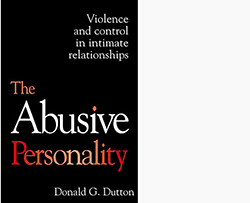Dutton (Univ. of British Columbia) provides a sweeping examination of research and theory with an eye toward intervention and change. Arguing that male abusive behavior is a natural and expected outgrowth from a particular personality configuration, the author suggests that three early factors constitute the core of the adult abusive personality: witnessing abuse, being shamed by a parent, and being insecurely attached through unpredictable parental emotional availability. The author covers early explanations of violence and control in intimate relationships, the learning of abusiveness, the psychology of the cycle of violence, the structure of the abusive personality, the primitive origins of rage, and attachment rage. He links the psychological profiles of abusive men with their partners’ reports of the form and frequency of the male’s abusiveness. A final chapter directed at clinicians focuses on the treatment of assaultiveness and includes suggestions for working with abusive individuals, who are often difficult clients. This volume contains a wealth of very useful material, including schematic diagrams illustrating points and hypothesized relationships, clear tables, copies of measurement instruments, ten pages of references, and endnotes (rather than footnotes). Upper-division undergraduates through professionals.

The Abusive Personality: Review by C. S. Widem
Review by C. S. Widem
SUNY at Albany
Source:
Widem, C. S. (1999). Book Review: Dutton, Donald G. The abusive personality: violence and control in intimate relationships. Guilford, 1998. 214p bibl index afp ISBN 1572303700. Choice: Reviews Online, 36(7). doi: 10.5860/CHOICE.36-4189



